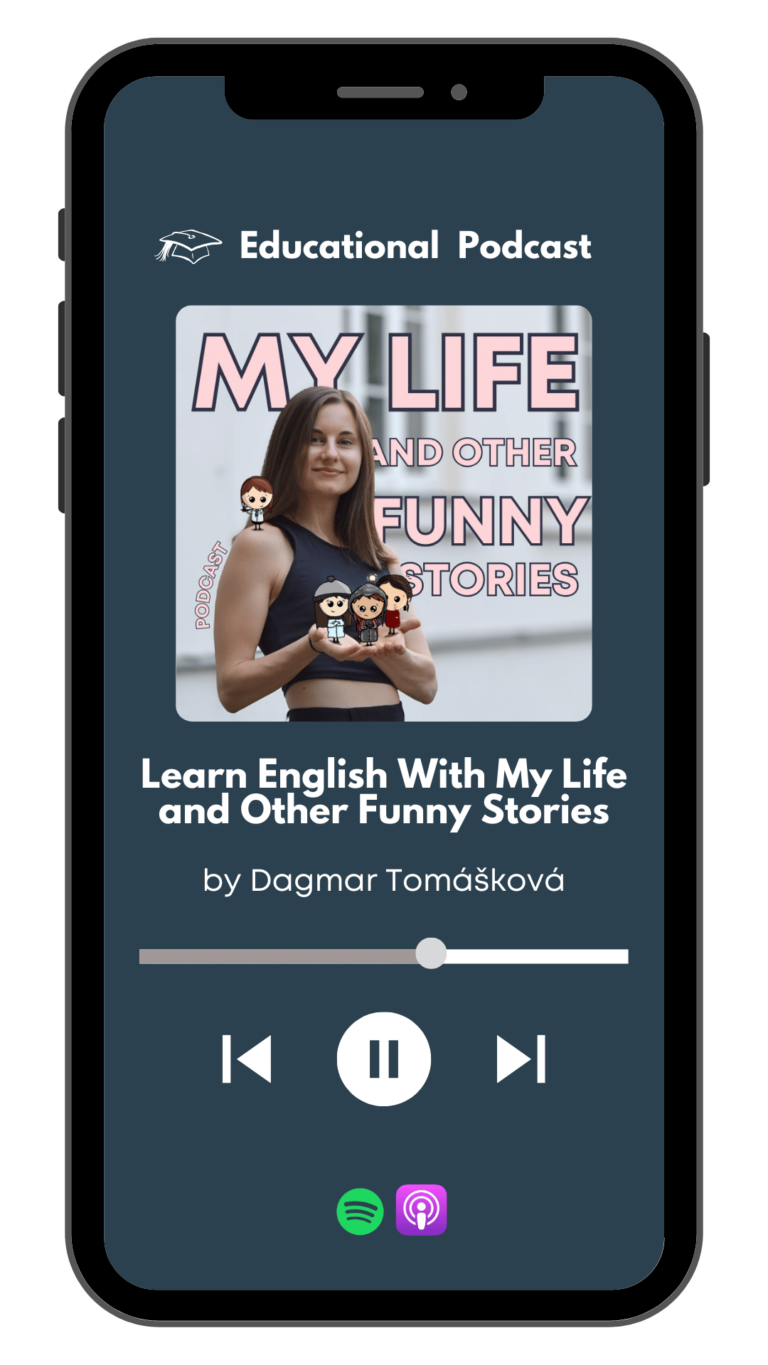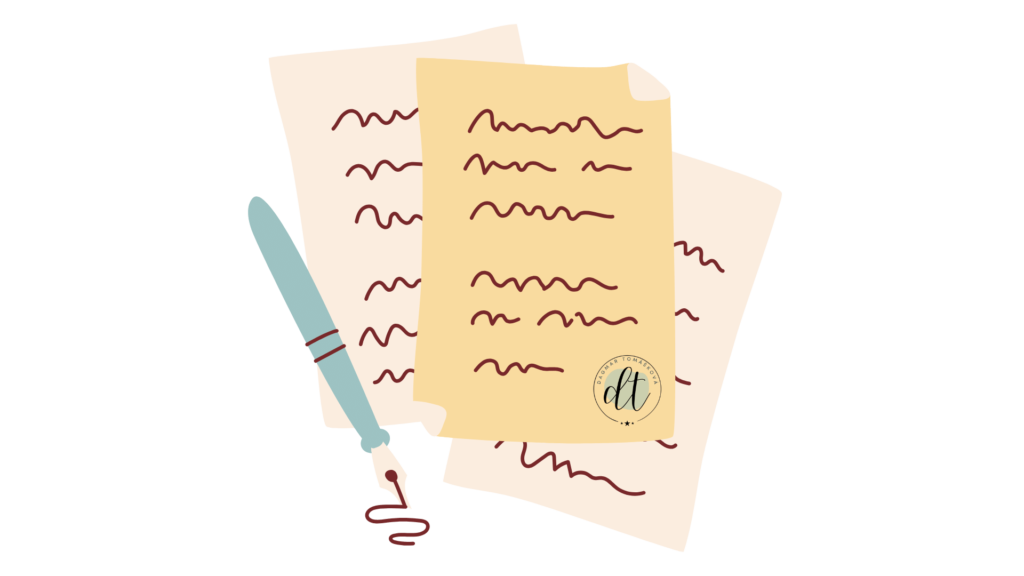
Ep.103: Why Saying “I Don’t Know” Makes You Sound More Confident
Today, I want to share something that helped me not only with my English and French but also with being a better tutor. And it’s this: learning to say the words “I don’t know” confidently.

LISTEN TO THE EPISODE HERE:
soon <3

Pokud chceš tento podcast a mou tvorbu podpořit, teď můžeš tady!

WRITTEN TRANSCRIPTION OF THE PODCAST
Hello and welcome to my podcast My Life and Other Funny Stories. My name is Dagmar Tomášková, I am an English tutor and coach, and I created this podcast for English students who want to improve their oral comprehension. As always, you can find the transcription of this episode and the vocabulary list in the notes of the podcast.
Today, I want to share something that helped me not only with my English and French but also with being a better tutor. And it’s this: learning to say the words “I don’t know” confidently.
I know it might sound stupid as I am saying it right now. “What’s so special about that?” Well, let me explain it to you. For a long time, I was afraid of admitting that I didn’t know something. Maybe you can relate. When someone asked me a question, especially in English, I felt like I had to know the answer. I thought that if I didn’t, it meant I wasn’t good enough, that people would think I was stupid, that I wasn’t professional, that I didn’t know what I was talking about. Because, I am teaching English, I should know everything, right?
Well, not really. I was thinking about it. When I was studying at university, the professors were teaching their subjects for years and years. Some of them were incredible and I felt like they must know everything about this particular topic. But still, sometimes, it got to a point where someone asked a question and they stopped, looked at you and said: “You know what, I actually don’t know that.” And it surprised me. Not in a bad way – but in a way that first of all, they didn’t know everything and second of all, they were not afraid to admit it. Or at least some of them were not afraid to admit it. Pride is a strong part of some of us and it used to be strong in me as well. I didn’t want to admit that I didn’t know anything – god damn it, I have been learning English for 17 years, including university studies, I should know everything by now. But with language and with any subject with such depth, it is impossible to know every nook and cranny of it. The more you study it, the more you realize that there is always so much more to learn. And it is scary. It is like swimming in the ocean, getting to the bottom of it, and then looking to the side and realizing there is a gaping hole next to you that goes even deeper.
A few years ago, I was teaching a lesson, and a student asked me about a very specific grammar rule that I hadn’t thought about in ages. And in that moment, I had a choice. I could try to bluff, to invent some complicated explanation that wasn’t really clear, or… I could just say the truth. So I took a deep breath and said, “You know what, I don’t know right now. But I’ll look it up together, I will share my screen and we can find out together.”
It might show the person next to you that you are not almighty but it also creates a connection. It shows that I’m human aand it shows that I’m not afraid to admit my limits.
So let’s talk about why it’s okay, and actually powerful, to say “I don’t know.”
First, nobody knows everything. Think about it: even the smartest scientists, the most successful business leaders, my English professors at university or anyone I have ever met…. they don’t know everything. They just know how to learn, how to find answers, they are curious and ever-studying. That means that they never stop learning. If you expect yourself to always have the answer, or if you are waiting for a moment in English where you’ll finally understand everything you’ll EVER hear or read, you’re holding yourself to an impossible standard.
Second, pretending to know can actually backfire. If you give an answer that you’re not sure about, people can usually feel it. You hesitate, you sound insecure, and it doesn’t come across as confident at all. By the way, to hesitate is to pause before you do or say something, often because you are uncertain or nervous about it. Ironically, saying “I don’t know” in a calm and clear way often makes you sound more confident, because you’re not trying to cover anything up.
And third, “I don’t know” can open the door to curiosity. When you admit you don’t know, you’re creating space to learn something new. You’re inviting others to share their knowledge, or you’re reminding yourself that you can go and find out. Because if you are at a point where you think you know everything, why would you learn something new? There is nothing new for you. And with that, you are closing doors on getting even better.
And I see this with my students all the time. When I ask a question and they freeze, I can almost see the thoughts in their head: “I don’t know the answer, I don’t know the grammar, I don’t know the word, what if I look stupid?” And at the beginning of our cooperation, they often stay silent, because silence feels safer than admitting they don’t know. But silence doesn’t help you learn. Saying “I don’t know” out loud – and then continuing, asking for help, or trying anyway and making mistakes, that’s how you move forward. But as we work together, they understand that I am not judging them. I am there to tell them that it is okay not to know and to help them. To fill in the gaps, to explain everything, to support them and teach them something new.
And also, I will tell you a small secret: there is not a mistake in the world that you could make that hasn’t been made before. And it is very probable that whatever mistake you make, I have already corrected with somebody else. You don’t have to be ashamed of not knowing or even of forgetting. That is actually the most human thing ever.
Think about yourself and areas you are incredibly good at. Maybe your work or your hobby or some specific field of knowledge that you are passionate about. Are you able to express out loud that you don’t know something? If not, maybe this can help…
Number one: literally practise the sentence “I don’t know.” Say it out loud, right now. “I don’t know.” Say it again, but this time, say it with confidence, not with shame. Imagine someone asks you a hard question, and you smile and say: “I don’t know.” Doesn’t it feel different?
Number two: expand your toolbox. By that I mean: learn new expressions so that you feel more confident in English. Instead of just “I don’t know,” you can also say things like:
“I’m not sure, but let me check.”
“That’s a good question, I’ll find out.”
“I don’t know yet but give me a minute”
All of these sound natural and give you time to go and learn it,
But I have to be honest with you. I know it can feel scary. Especially in professional situations. You might worry that your boss or your colleagues will think less of you. But in my experience, the opposite is true. Because at the end of the day, you are an expert, you just happen to learn something new today.
Alright, let’s summarise today’s episode. Learning to say “I don’t know” with confidence has three big benefits. First, it takes the pressure off, because nobody knows everything. Second, it actually makes you sound more confident, because you’re honest and authentic. And third, it opens the door to curiosity and learning.
Yep, that’s all for today. And just a small piece of information for anyone listening to this podcast every week – I might start publishing an episode once every two weeks or so for a while instead of weekly. Or just in general, if an episode doesn’t come out on every Friday, I am really sorry. I am doing my best. But I have been feeling the worst imposter syndrome when it comes to content creation, now I mean Instagram and also this podcast. What I mean by that is that I am not really happy with the way I am doing things right now and I am find myself not being fully happy with the results. It might be a thing of comparison – there are so many people creating similar things and I just feel like you might get better content than mine from anyone else. It might go away in a while, hopefully it does but if these episodes are not as regular as they used to, I am sorry in advance. But as I said, I will try my best.
Thank you so much for listening to today’s episode. If you liked it, please leave me a five-star rating and share it with your friends. And remember, you can always find the transcript and the vocabulary list in the notes of the podcast. See you next time.. Bye bye.

VOCABULARY LIST
to admit – přiznat
to relate (to something) – ztotožnit se (s něčím), najít v tom podobnost
pride – hrdost, pýcha
depth – hloubka
nook and cranny – každé zákoutí, každý detail
gaping hole – zívající díra (obrazně: obrovská mezera, prázdnota)
to bluff – blafovat, předstírat
almighty – všemocný
to hold yourself to a standard – klást na sebe nároky
to backfire – obrátit se proti tobě
to hesitate – zaváhat
to come across (as confident) – působit (jako sebevědomý)
to cover something up – zakrýt něco, utajit
to open the door to curiosity – otevřít dveře zvědavosti
to freeze (mentally) – ztuhnout, zablokovat se
to judge – soudit, hodnotit
to fill in the gaps – vyplnit mezery
to be ashamed (of something) – stydět se (za něco)
the most human thing ever – ta nejlidštější věc vůbec
toolbox (figurative) – sada nástrojů, repertoár možností
to expand – rozšířit
imposter syndrome – pocit, že nejsi dost dobrý, že někam nepatříš
comparison – srovnávání
in advance – předem